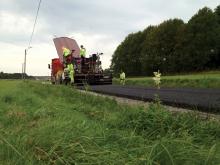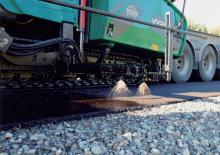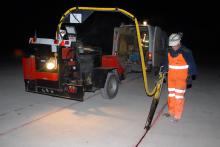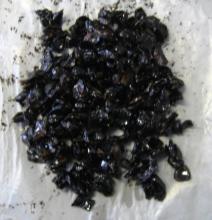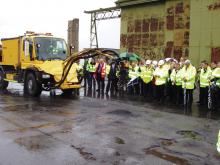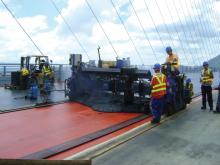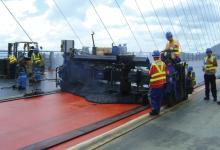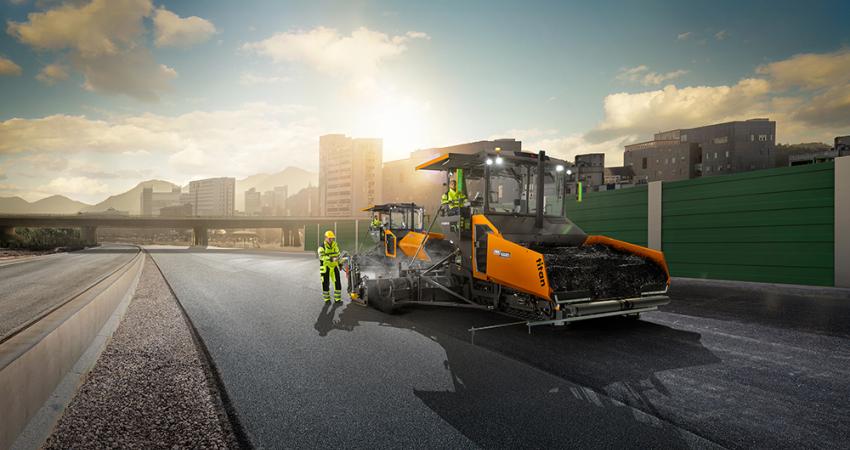Russia is home to all of the world’s climatic zones and to over 6,000 bridges. Rain and wind, sun and heat, snow and ice mean that the Russian weather is extreme, and because its bridges need special protection their structural elements are insulated with bituminous sheeting. Evonik says that temperature stability and long life are key criteria for selecting insulating materials, and this has led to an increase in the use of special sheeting, some of which has been modified with its Vestoplast product.
Ove
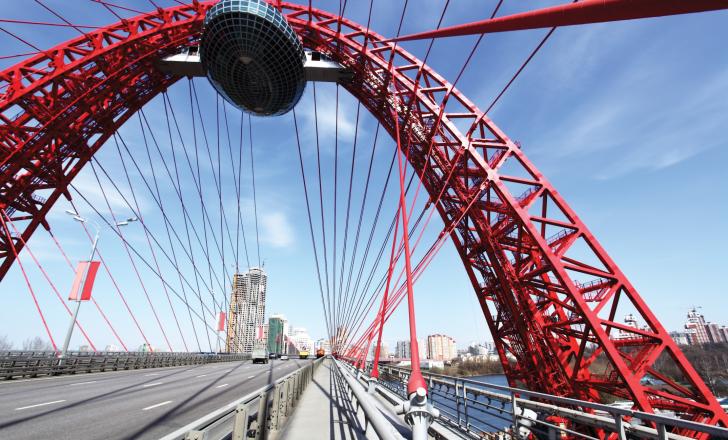
The Zhivopisny Bridge in Moscow is treated with special sheeting
Russia is home to all of the world’s climatic zones and to over 6,000 bridges.
Rain and wind, sun and heat, snow and ice mean that the Russian weather is extreme, and because its bridges need special protection their structural elements are insulated with bituminous sheeting.
4009 Evonik says that temperature stability and long life are key criteria for selecting insulating materials, and this has led to an increase in the use of special sheeting, some of which has been modified with its Vestoplast product.
Over 10 million people live in Russia’s capital, and each day many of Moscow’s inhabitants cross the Zhivopisny Bridge, the tallest cable-stayed bridge in Europe.
“The bridge is exposed to Russia’s formidable continental climate every day as well, with heat, freezing temperatures, moisture, road salt and UV radiation all wearing on its concrete and steel,” says Evonik.
“And that could potentially result in corrosion, making it only a matter of time before cracks and flaws begin to appear in the supporting structures of the bridge.
“A protective layer of sealant between supporting elements and the multi-layered pavement improves the situation as this is a sensitive area where water can collect and break down the concrete from within.”
Evonik says modified bituminous sheeting has proven to be a reliable sealant.
“Oxidation processes, however, make pure bitumen brittle and prone to cracking, while temperatures around 40ºC cause it to soften. A solution is to combine the bitumen compound with special additives that improve stability under hot and cold conditions.”
The company says bitumen in the polymer-modified sheeting is combined with Vestoplast, a polyolefin (a thermoplastic polymer that forms a uniform matrix with bitumen).
TechnoNICOL, a Russian manufacturer of construction and waterproofing materials, uses VESTOPLAST for producing bituminous sheeting and this is said to be used in many bridges in Russia including the Zhivopisny Bridge and the Presidential Bridge in Ulyanovsk, which is the longest bridge in Russia.
Sheeting with Vestoplast has also been installed on bridges along the 47km of the Western High Speed Diameter Motorway encircling St Petersburg.
Rain and wind, sun and heat, snow and ice mean that the Russian weather is extreme, and because its bridges need special protection their structural elements are insulated with bituminous sheeting.
Over 10 million people live in Russia’s capital, and each day many of Moscow’s inhabitants cross the Zhivopisny Bridge, the tallest cable-stayed bridge in Europe.
“The bridge is exposed to Russia’s formidable continental climate every day as well, with heat, freezing temperatures, moisture, road salt and UV radiation all wearing on its concrete and steel,” says Evonik.
“And that could potentially result in corrosion, making it only a matter of time before cracks and flaws begin to appear in the supporting structures of the bridge.
“A protective layer of sealant between supporting elements and the multi-layered pavement improves the situation as this is a sensitive area where water can collect and break down the concrete from within.”
Evonik says modified bituminous sheeting has proven to be a reliable sealant.
“Oxidation processes, however, make pure bitumen brittle and prone to cracking, while temperatures around 40ºC cause it to soften. A solution is to combine the bitumen compound with special additives that improve stability under hot and cold conditions.”
The company says bitumen in the polymer-modified sheeting is combined with Vestoplast, a polyolefin (a thermoplastic polymer that forms a uniform matrix with bitumen).
TechnoNICOL, a Russian manufacturer of construction and waterproofing materials, uses VESTOPLAST for producing bituminous sheeting and this is said to be used in many bridges in Russia including the Zhivopisny Bridge and the Presidential Bridge in Ulyanovsk, which is the longest bridge in Russia.
Sheeting with Vestoplast has also been installed on bridges along the 47km of the Western High Speed Diameter Motorway encircling St Petersburg.

